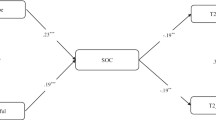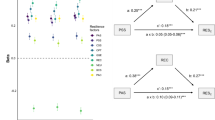Abstract
In the global crisis caused by the COVID-19 pandemic, young professionals and graduating students experience considerable psychological adversity due to the uncertainty surrounding their futures. Given the positive psychological outcomes and the potential to alleviate stress, we examine the role of resilience and hope in causing a substantial variance in the stress response to anticipation of crisis among Indians living in India and Germany. Resilience, hope, crisis apprehension, and the psychological response to the COVID-19 pandemic were measured among participants from India and Germany (n = 650) via an online survey using non-probability convenient sampling. Parallel mediation and conditional indirect effects showcase the differential roles of resilience and hope among socio-culturally similar but geographically divergent groups. Hope mediates the effect of pandemic-led crisis apprehension on perceived stress among those residing in India; resilience operates to mitigate stress among those from Germany. Findings highlight the contradistinctive role of resilience and hope in reducing stress and imply an urgent need for promotion of ameliorative practices. Resilience effectively mitigates the psychological burden of the COVID-19 crisis and can be promoted to reskill individuals; however, elevating hope in a crisis obligates prudence.
Access this chapter
Tax calculation will be finalised at checkout
Purchases are for personal use only
Similar content being viewed by others
References
Ahorsu, D. K., Lin, C. Y., Imani, V., Saffari, M., Griffiths, M. D., & Pakpour, A. H., (2020). The fear of COVID-19 scale: Development and initial validation. International Journal of Mental Health and Addiction, 1–9. Advance online publication. https://doi.org/10.1007/s11469-020-00270-8
Avey, J. B., Wernsing, T. S., & Luthans, F. (2008). Can positive employees help positive organizational change? Impact of psychological capital and emotions on relevant attitudes and behaviors. The Journal of Applied Behavioral Science, 44(1), 48–70.
Bäuerle, A., Steinbach, J., Schweda, A., Beckord, J., Hetkamp, M., Weismüller, B., & Skoda, E. M. (2020). Mental health burden of the COVID-19 outbreak in Germany: Predictors of mental health impairment. Journal of Primary Care & Community Health, 11, 2150132720953682. https://doi.org/10.1177/2150132720953682
Billings, R. S., Milburn, T. W., & Schaalman, M. L. (1980). A model of crisis perception: A theoretical and empirical analysis. Administrative Science Quarterly, 25(2), 300–316. https://doi:https://doi.org/10.2307/2392456
Brooks, S. K., Webster, R. K., Smith, L. E., Woodland, L., Wessely, S., Greenberg, N., & Rubin, G. J. (2020). The psychological impact of quarantine and how to reduce it: Rapid review of the evidence. The Lancet, 395(10227), 912–920. https://doi:https://doi.org/10.1016/S0140-6736(20)30460-8
Chang, E. C., & Banks, K. H. (2007). The color and texture of hope: Some preliminary findings and implications for hope theory and counseling among diverse racial/ethnic groups. Cultural Diversity and Ethnic Minority Psychology, 13(2), 94–103. https://doi.org/10.1037/1099-9809.13.2.94
Cohen, S., Kamarck, T., & Mermelstein, R. (1983). A global measure of perceived stress. Journal of Health and Social Behavior, 24, 386–396.
Crayne, M. P., & Medeiros, K. E. (2021). Making sense of crisis: Charismatic, ideological, and pragmatic leadership in response to COVID-19. American Psychologist, 76(3), 462–474. https://doi.org/10.1037/amp0000715
Dar, A. A., Deb, S., Thomas, S., Dhamodharan, M., Jahan, F., Sumaiya, B., & Gupta, S. (2021). Evidence and predictors of resilience among young adults exposed to traumatic events of the armed conflict in Kashmir. Child and Youth Services, Online First. https://doi.org/10.1080/0145935X.2021.1981133
Drury, J., Cocking, C., & Reicher, S. (2009). The nature of collective resilience: Survivor reactions to the 2005 London bombings. International Journal of Mass Emergencies and Disasters, 27(1), 66–95.
Duggal, D., Sacks-Zimmerman, A., & Liberta, T. (2016). The impact of hope and resilience on multiple factors in neurosurgical patients. Cureus, 8(10), e849. https://doi.org/10.7759/cureus.849
Folkman, S. (2010). Stress, health, and coping: synthesis, commentary, and future directions. The Oxford Handbook of Stress, Health, and Coping 453.
Grover, S., Sahoo, S., Mehra, A., Avasthi, A., Tripathi, A., Subramanyan, A., Pattojoshi, A., Rao, G. P., Saha, G., Mishra, K. K., Chakraborty, K., Rao, N. P., Vaishnav, M., Singh, O. P., Dalal, P. K., Chadda, R. K., Gupta, R., Gautam, S., Sarkar, S., … Janardran Reddy, Y. C. (2020). Psychological impact of COVID-19 lockdown: An online survey from India. Indian Journal of Psychiatry, 62(4), 354–362. https://doi.org/10.4103/psychiatry.IndianJPsychiatry_427_20
Hayes, A. F. (2017). Introduction to mediation, moderation, and conditional process analysis: A regression-based approach. Guilford Publications.
Hofstede, G. (2011). Dimensionalizing cultures: The Hofstede model in context. Online Readings in Psychology and Culture 2(1). https://doi.org/10.9707/2307-0919.1014
Knolle, F., Ronan, L., & Murray, G. K. (2021). The impact of the COVID-19 pandemic on mental health in the general population: A comparison between Germany and the UK. BMC Psychology, 9(1), 1–17. https://doi.org/10.1186/s40359-021-00565-y
Lengacher, C. A., Johnson-Mallard, V., Barta, M., Fitzgerald, S., Moscoso, M. S., Post-White, J., & Kip, K. E. (2011). Feasibility of a mindfulness-based stress reduction program for early-stage breast cancer survivors. Journal of Holistic Nursing, 29(2), 107–117. https://doi.org/10.1177/0898010110385938
Lopez, S. J., Pedrotti, J. T., & Snyder, C. R. (2018). Positive psychology: The scientific and practical explorations of human strengths. Sage Publications.
Markovitz, G., 2020. World Economic Forum. At least half of people who have a job fear they'll lose it in the next 12 months. Retrieved on September 04, 2021 from https://www.weforum.org/agenda/2020/10/more-than-half-of-working-adults-fear-for-their-jobs/
Mimura, C., & Griffiths, P. (2008). A Japanese version of the Perceived Stress Scale: cross-cultural translation and equivalence assessment. BMC Psychiatry, 8(1), 1–7. https://doi:https://doi.org/10.1186/1471-244X-8-85
Munoz, R. T., Hanks, H., & Hellman, C. M. (2020). Hope and resilience as distinct contributors to psychological flourishing among childhood trauma survivors. Traumatology 26(2) 177–184. https://doi:https://doi.org/10.1037/trm0000224
Paton, D., Parkes, B., Daly, M., & Smith, L., 2008.Fighting the flu: Developing sustained community resilience and preparedness. Health Promotion Practice 9(4_suppl) 45S-53S.
Petzold, M. B., Bendau, A., Plag, J., Pyrkosch, L., MascarellMaricic, L., Betzler, F., Rogoll, J., Große, J., & Ströhle, A. (2020). Risk, resilience, psychological distress, and anxiety at the beginning of the COVID-19 pandemic in Germany. Brain and Behavior, 10(9), e01745. https://doi.org/10.1002/brb3.1745
Qiu, J., Shen, B., Zhao, M., Wang, Z., Xie, B., & Xu, Y. (2020). A nationwide survey of psychological distress among Chinese people in the COVID-19 epidemic: Implications and policy recommendations. General Psychiatry, 33(2), e100213. https://doi.org/10.1136/gpsych-2020-100213
Robert Koch Institut (2020). COVID-19: Fallzahlen in Deutschland und weltweit. Retrieved on September 06, 2021 from https://www.rki.de/DE/Content/InfAZ/N/Neuartiges_
Russo, S. J., Murrough, J. W., Han, M. H., Charney, D. S., & Nestler, E. J. (2012). Neurobiology of resilience. Nature Neuroscience, 15(11), 1475–1484. https://doi.org/10.1038/nn.3234
Schlichtiger, J., Brunner, S., Steffen, J., & Huber, B. C. (2020). Mental health impairment triggered by the COVID-19 pandemic in a sample population of German students. Journal of Investigative Medicine, 68(8), 1394–1396.
Smith, B. W., Dalen, J., Wiggins, K., Tooley, E., Christopher, P., & Bernard, J. (2008). The brief resilience scale: Assessing the ability to bounce back. International Journal of Behavioral Medicine, 15(3), 194–200.
Snyder, C. R., & Feldman, D. B. (2000). Hope for the many: An empowering social agenda. In Handbook of Hope, 389–412. Academic Press.
Snyder, C. R., Harris, C., Anderson, J. R., Holleran, S. A., Irving, L. M., Sigmon, S. T., & Harney, P. (1991). The will and the ways: Development and validation of an individual-differences measure of hope. Journal of Personality and Social Psychology, 60(4), 570–585. https://doi.org/10.1037/0022-3514.60.4.570
Tavakol, M., & Dennick, R. (2011). Making sense of Cronbach’s alpha. International Journal of Medical Education, 2, 53–55. https://doi.org/10.5116/ijme.4dfb.8dfd
Terpstra, T. (2011). Emotions, trust, and perceived risk: Affective and cognitive routes to flood preparedness behavior. Risk Analysis: An International Journal, 31(10), 1658–1675.
Wang, C., Pan, R., Wan, X., Tan, Y., Xu, L., Ho, C. S., & Ho, R. C. (2020). Immediate psychological responses and associated factors during the initial stage of the 2019 coronavirus disease (COVID-19) Epidemic among the General Population in China. International Journal of Environmental Research and Public Health, 17(5), 1729. https://doi.org/10.3390/ijerph17051729
West, C. P., Dyrbye, L. N., Sinsky, C., Trockel, M., Tutty, M., Nedelec, L., Carlasare, L. E., & Shanafelt, T. D. (2020). Resilience and burnout among physicians and the general US working population. JAMA Network Open, 3(7), e209385. https://doi.org/10.1001/jamanetworkopen.2020.9385
World Health Organization. (2021). Coronavirus disease (COVID-19) pandemic. Retrieved on September 15, 2021 from https://www.who.int/emergencies/diseases/novel-coronavirus-2019
Yeager, D. S., & Dweck, C. S. (2012). Mindsets that promote resilience: When students believe that personal characteristics can be developed. Educational Psychologist, 47(4), 302–314.
Youssef, C. M., & Luthans, F. (2007). Positive organizational behavior in the workplace: The impact of hope, optimism, and resilience. Journal of Management, 33(5), 774–800.
Zhang, J., Lu, H., Zeng, H., Zhang, S., Du, Q., Jiang, T., & Du, B. (2020). The differential psychological distress of populations affected by the COVID-19 pandemic. Brain, Behavior, and Immunity, 87 49–50. https://doi:https://doi.org/10.1016/j.bbi.2020.04.031
Zhou, S. J., Zhang, L. G., Wang, L. L., Guo, Z. C., Wang, J. Q., Chen, J. C., Liu, M., Chen, X., & Chen, J. X. (2020). Prevalence and socio-demographic correlates of psychological health problems in Chinese adolescents during the outbreak of COVID-19. European Child and Adolescent Psychiatry, 29(6), 749–758. https://doi.org/10.1007/s00787-020-01541-4
Author information
Authors and Affiliations
Corresponding author
Editor information
Editors and Affiliations
Rights and permissions
Copyright information
© 2023 The Author(s), under exclusive license to Springer Nature Singapore Pte Ltd.
About this chapter
Cite this chapter
Mukherjee, T., Deb, S., Deb, S. (2023). Mitigating Mental Health Burden of Youth During COVID-19 Through Resilience and Hope: Evidences from India and Germany. In: Deb, S., Deb, S. (eds) Handbook of Youth Development. Springer, Singapore. https://doi.org/10.1007/978-981-99-4969-4_29
Download citation
DOI: https://doi.org/10.1007/978-981-99-4969-4_29
Published:
Publisher Name: Springer, Singapore
Print ISBN: 978-981-99-4968-7
Online ISBN: 978-981-99-4969-4
eBook Packages: Social SciencesSocial Sciences (R0)




